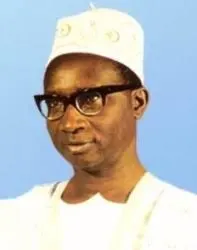By Abubacarr
Copyright standard

By Kebba Nanko,Director of Policy, PPPBanjul, The Gambia
When President Adama Barrow stood before Gambians and regional leaders in October 2021 to inaugurate the OMVG Soma Sub-Station, his message carried both pride and promise. He highlighted integration, cooperation, and a vision to deliver energy for all Gambians by 2025.However, what the nation must never forget is that this progress did not begin in 2021. The foundation of rural electrification and regional energy integration was laid nearly five decades ago by Sir Dawda Kairaba Jawara and the People’s Progressive Party (PPP) government.
A vision born in 1976In June 1976, Sir Dawda Kairaba Jawara of The Gambia and President Léopold Sédar Senghor of Senegal signed the landmark OMVG agreement, creating the Gambia River Basin Development Organisation (OMVG).Their mission was revolutionary for its time:1. Harness the Gambia River’s energy potential for shared development.2. Build cross-border cooperation to deliver power to rural communities.3. Secure regional energy independence through integration and shared resources.By 1978, the vision expanded to include Guinea and Guinea-Bissau, transforming OMVG into a sub-regional partnership for sustainable energy and development.
From vision to realityThe Soma Sub-Station, with its 225/30 KV capacity, is today one of the critical nodes in OMVG’s interconnected energy grid. Drawing power from Guinea’s Kaléta and Souapiti hydroelectric plants, it delivers reliable electricity to Soma and surrounding communities, powering homes, schools, clinics, and businesses in rural areas.This reality perfectly reflects Sir Dawda’s foresight: a vision of a regional energy network designed to empower communities and drive national progress.
Correcting the recordRecent statements by certain government officials, including the Minister of Information, Dr Ismaila Ceesay, claiming that “no government has ever done what this government has done,” are factually incorrect and historically misleading.1. Without the 1976 OMVG framework, there would be no regional energy network to support rural electrification today.2. Without the 1978 regional expansion, there would be no access to key hydroelectric plants like Kaléta and Souapiti.3. Without PPP’s diplomatic foresight, there would be no long-term partnerships or funding from the African Development Bank, World Bank, European Investment Bank, and other global partners that continue to sustain these projects.The current administration deserves credit for advancing the implementation of existing projects, but it cannot rewrite history to erase the PPP’s foundational role in shaping The Gambia’s energy future.
Global recognitionIn 2017, OMVG officials visited Sir Dawda at his residence in Fajara to pay homage and to honour him as the co-founder of one of Africa’s most successful energy integration projects.Their message to the Gambian people was clear: “The baby you brought into the world is now a big boy benefiting the entire sub-region.”This international recognition cements the truth: today’s rural electrification achievements are the direct result of the PPP’s proactive planning and strategic diplomacy.
Honouring the past, powering the futureAs lights illuminate rural communities across The Gambia, they symbolise more than just modern progress. They are a glowing testament to visionary leadership.Sir Dawda and the PPP understood that electricity is more than infrastructure; it is the lifeblood of development. It powers classrooms, fuels businesses, keeps health facilities operational, and transforms villages into centre of opportunity.
ConclusionThe current administration has a role in implementation, but history must acknowledge that the PPP laid the foundation.Every home illuminated, every student studying under a bright light, and every rural clinic powered for critical care is proof that the PPP’s legacy is alive and thriving.The rural electrification story of The Gambia is, in every sense, the story of a vision fulfilled — a vision born in 1976 by Sir Dawda Kairaba Jawara and carried forward by generations committed to seeing The Gambia shine.